Premier of Western Australia
The Premier of Western Australia is the head of the executive branch of government in the Australian state of Western Australia. The Premier has similar functions in Western Australia to those performed by the Prime Minister of Australia at the national level, subject to the different Constitutions.
| Premier of Western Australia | |
|---|---|
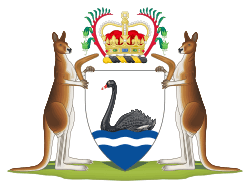 | |
| Style | The Honourable |
| Appointer | Governor of Western Australia |
| Term length | At the Governor's pleasure |
| Inaugural holder | John Forrest |
| Formation | 29 December 1890 |
The incumbent Premier of Western Australia is Mark McGowan who won the 2017 state election and was sworn in on 17 March 2017 by Governor Kerry Sanderson as the 30th Premier of Western Australia.[1]
Function
The premier must be a member of one of the two Houses of the Parliament of Western Australia; and by convention the premier is a member of the lower house, the Legislative Assembly.[a] He or she is appointed by the governor on the advice of the lower house, and must resign if he or she loses the support of the majority of that house. Consequently, the premier is almost always the leader of the political party or coalition of parties with the majority of seats in the lower house.
History

The office of premier of Western Australia was first formed in 1890, after Western Australia was officially granted responsible government by Britain in 1889. The Constitution of Western Australia[2] does not explicitly provide for a premier, and the office was not formally listed as one of the executive offices until the appointment of Ross McLarty in 1947. Nonetheless, John Forrest immediately adopted the title on taking office as first premier of Western Australia in 1890, and it has been used ever since.
John Forrest was the only premier of Western Australia as a self-governing colony. Following the Federation of Australia in 1901, Western Australia became an Australian state and the responsibilities of the office of premier were diminished.
Party politics began in Western Australia with the rise of the Labor party in 1901. By 1904, the party system was entrenched in Western Australian politics. Since then the premiers have been associated with political parties.
Western Australia's constitution contains nothing to preclude the premier being a member of the upper house, the Western Australian Legislative Council. Historically and by convention, however, the premier is a member of the Assembly. The only exception has been Hal Colebatch, a member of the Legislative Council who accepted the premiership in April 1919 on the understanding that an Assembly seat would be found for him, only to resign a month later when no seat could be found.
During the economic boom of the 1980s, the Western Australian government became closely involved with a number of large businesses. A succession of deals were made between the government and businesses, and these ultimately caused great losses for the state. A subsequent royal commission found evidence of widespread corruption. Three former premiers were found to have acted improperly and two of them, Ray O'Connor and Brian Burke, were jailed. This scandal became popularly known as WA Inc.
List of Premiers of Western Australia
| № | Name (lifespan) | Portrait | Constituency | Party | Term of office | Ministry | Election(s) | Ref | |
|---|---|---|---|---|---|---|---|---|---|
| 1 | Sir John Forrest (1847–1918) | 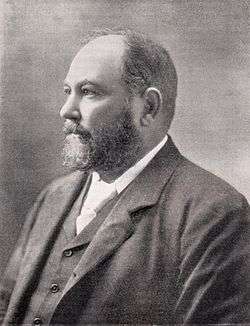 | MLA for Bunbury 1890–1901 (resigned) | none[b] (pro-Forrest) | 29 December 1890 | 15 February 1901 | Forrest Ministry | 1890 1894 1897 | [3] |
| Appointed by Governor William Robinson as the first premier of Western Australia. Began large-scale public works projects, including Fremantle Harbour and the Goldfields Water Supply Scheme. Perth Mint opened. Represented Western Australia at Federation conferences. Resigned in February 1901 to run for the seat of Swan in the federal House of Representatives. | |||||||||
| 2 | George Throssell (1840–1910) | .jpg) | MLA for Northam 1890–1904 (resigned) MLC for East Province 1907–1910 (died) | none[b] (pro-Forrest) | 15 February 1901 | 27 May 1901 | Throssell Ministry | 1901 | [4] |
| Took over as Premier and Treasurer after Forrest's resignation in February 1901. Contested the 1901 election as Premier, but resigned after his faction failed to win a majority of seats. | |||||||||
| 3 | George Leake (I) (1856–1902) |  | MLA for Roebourne 1890 (resigned) MLA for Albany 1894–1900 (resigned) MLA for West Perth 1901–1902 (died) | none[b] (Opposition) | 27 May 1901 | 21 November 1901 | 1st Leake Ministry | – | [5] |
| Became Premier as a compromise between the opposing factions of Frederick Illingworth and George Throssell. Served for five months before his government was defeated on a no-confidence vote. | |||||||||
| 4 | Alf Morgans (1850–1933) | .jpg) | MLA for Coolgardie 1897–1904 (resigned) | none[b] (Ministerialist) | 21 November 1901 | 23 December 1901 | Morgans Ministry | – | [6] |
| Served as Premier for 32 days as a compromise after George Leake's government was defeated. Resigned after members of his Cabinet were defeated in a ministerial by-election. | |||||||||
| – (3) | George Leake (II) (1856–1902) |  | MLA for Roebourne 1890 (resigned) MLA for Albany 1894–1900 (resigned) MLA for West Perth 1901–1902 (died) | none[b] (Opposition) | 23 December 1901 | 24 June[c] 1902 | 2nd Leake Ministry | – | [5] |
| Again became Premier after the failure of Alf Morgans' government. Died in office on 24 June 1902. | |||||||||
| 5 | Sir Walter James (1863–1943) | 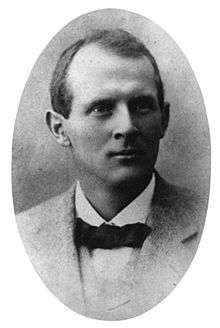 | MLA for East Perth 1894–1904 (resigned) | none[b] (Opposition) | 1 July[c] 1902 | 10 August 1904 | James Ministry | 1904 | [7] |
| Sworn in as Premier after Leake's death. Led a reforming government, which legalised trade unions and introduced workers' compensation and a stronger Arbitration Act. Unsuccessfully attempted to reform the franchise. Defeated in a no-confidence motion after the 1904 election. | |||||||||
| 6 | Henry Daglish (1866–1920) | 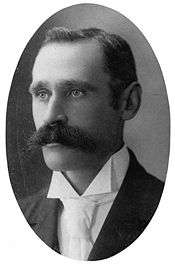 | MLA for Subiaco 1901–1911 (lost seat) | Labor Party | 10 August 1904 | 25 August 1905 | Daglish Ministry | – | [8] |
| Western Australia's first Labor premier. John Drayon, a newspaper editor, imprisoned under parliamentary privilege. Defeated after twelve months over plans to buy out the Midland Railway Company for £1.5 million. | |||||||||
| 7 | Sir Hector Rason (1858–1927) | .jpg) | MLC for Swan 1889–1890 (resigned) MLA for South Murchison 1897–1901 (resigned) MLA for Guildford 1901–1906 (resigned) | Ministerialist | 25 August 1905 | 7 May 1906 | Morgans Ministry | 1905 | [9] |
| Became premier after Henry Daglish's government was defeated. Headed a Royal Commission on immigration. Resigned in 1906 after appointing himself Agent General. | |||||||||
| 8 | Sir Newton Moore (1870–1936) | .jpeg) | MLA for Bunbury 1904–1911 (resigned) | Ministerialist | 7 May 1906 | 16 September 1910 | Moore Ministry | 1908 | [10] |
| Began as premier at age 36, with only two years of parliamentary experience, at the time the youngest ever premier. Placed emphasis on agriculture and rural development, establishing the Wheatbelt and implementing the Income and Land Tax. Resigned in September 1910 on grounds of ill health. | |||||||||
| 9 | Frank Wilson (I) (1859–1918) | .jpeg) | MLA for Canning 1895–1901 (seat abolished) MLA for Perth 1901 (lost seat) MLA for Sussex 1904–1917 (lost seat) | Ministerialist | 16 September 1910 | 7 October 1911 | 1st Wilson Ministry | 1911 | [11] |
| Pushed through legislation which established the University of Western Australia and a number of electoral reform bills. Lost in a landslide to Labor at the 1911 election. | |||||||||
| 10 | John Scaddan (1876–1934) | 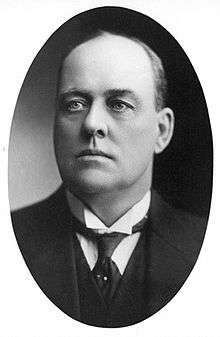 | MLA for Ivanhoe 1904–1911 (seat abolished) MLA for Brown Hill-Ivanhoe 1911–1916 (resigned) 1916–1917 (lost seat) MLA for Albany 1919–1924 (did not contest) MLA for Maylands 1930–1933 (lost seat) | Labor Party | 7 October 1911 | 27 July 1916 | Scaddan Ministry | 1914 | [12] |
| Passed a number of reform bills, established a state income tax, extended workers' compensation, reformed the education system, and set up a number of state-owned industries, including the State Shipping Service, abattoirs, sawmills, quarries, brickworks and farms. SS Koombana wrecked off the coast of Port Hedland. Government defeated July 1916, in part due to heavy debt and the Nevanas affair. | |||||||||
| – (9) | Frank Wilson (II) (1859–1918) | .jpeg) | MLA for Canning 1895–1901 (seat abolished) MLA for Perth 1901 (lost seat) MLA for Sussex 1904–1917 (lost seat) | Liberal Party | 27 July 1916 | 28 June 1917 | 2nd Wilson Ministry | – | [11] |
| Returned as premier after Scaddan's Labor government lost a majority in the lower house. Replaced by Henry Lefroy as premier after a new Nationalist Party was formed, without Wilson and several of his ministers. | |||||||||
| 11 | Henry Lefroy (1854–1930) | 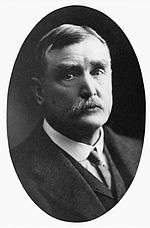 | MLA for Moore 1892–1901 (did not contest) 1911–1921 (did not contest) | Nationalist Party | 28 June 1917 | 17 April 1919 | Lefroy Ministry | 1917 | [13] |
| Elected leader by the newly formed majority Nationalist Party. Moore River Native Settlement established 1918. Resigned in 1919 after an unsuccessful leadership spill which forced Lefroy to cast the deciding vote on his premiership. | |||||||||
| 12 | Hal Colebatch (1872–1953) | 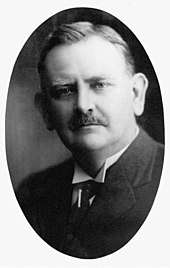 | MLC for East Province 1912–1923 (resigned) | Nationalist Party | 17 April 1919 | 17 May 1919 | Lefroy Ministry | – | [14] |
| After being elected leader of the Nationalist Party, Colebatch served as premier from the Legislative Council with the understanding that a lower house seat would be found for him. Resigned after a month when no seat could be found for him. Pelted with rocks during the Fremantle wharf crisis. The only person to serve as premier while a member of the upper house, and the short-serving premier. | |||||||||
| 13 | Sir James Mitchell (I) (1866–1951) | 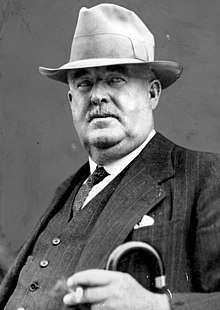 | MLA for Northam 1905–1933 (lost seat) | Nationalist Party | 17 May 1919 | 16 April 1924 | 1st Mitchell Ministry | 1921 1924 | [15] |
| Established a strong Western Australian dairy industry. Initiated the Group Settlement and Soldier Settlement Schemes in the South West. Race riots in Broome in 1920. Defeated by Labor at the 1924 election. | |||||||||
| 14 | Philip Collier (I) (1873–1948) | 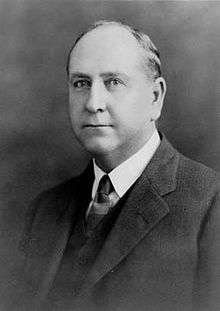 | MLA for Boulder 1905–1948 (died) | Labor Party | 16 April 1924 | 24 April 1930 | 1st Collier Ministry | 1927 1930 | [16] |
| Reduced taxation, allowing the first surplus in 16 years. Continued the previous government's rural development initiatives. Woods Royal Commission on the Forrest River massacre. Centenary of Western Australia celebrated. Introduced a minimum wage and a 40-hour working week. | |||||||||
| – (13) | Sir James Mitchell (II) (1866–1951) |  | MLA for Northam 1905–1933 (lost seat) | Nationalist Party | 24 April 1930 | 24 April 1933 | 2nd Mitchell Ministry | 1933 | [15] |
| Returned after the 1930 election, governing in coalition with the Country Party. Secession referendum held in 1933 was passed with 66% of the vote, however, the Nationalist/Country coalition lost power at the 1933, and the returning Labor government did not act on the results. Moseley Royal Commission regarding the treatment of Aboriginals established. | |||||||||
| – (14) | Philip Collier (II) (1873–1948) |  | MLA for Boulder 1905–1948 (died) | Labor Party | 24 April 1933 | 19 August 1936 | 2nd Collier Ministry | 1936 | [16] |
| Led his party to victory at the 1936 election. Resigned August 1936. Over his two terms, served nine years and 126 days, the longest by a Labor premier. | |||||||||
| 15 | John Willcock (1879–1956) | 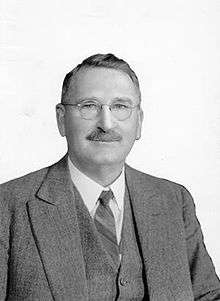 | MLA for Geraldton 1917–1947 (died) | Labor Party | 20 August 1936 | 31 July 1945 | Willcock Ministry | 1939 1943 | [17] |
| Introduced a range of small secondary industries. Considered a plan for a Jewish homeland in the Kimberley. Japanese planes attack Broome and the MV Koolama. Represented Western Australia at the coronation of King George V in 1937. Resigned in 1945 due to ill health. | |||||||||
| 16 | Frank Wise (1897–1986) | 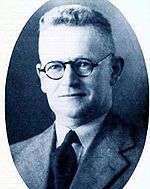 | MLA for Gascoyne 1933–1951 (resigned) | Labor Party | 31 July 1945 | 1 April 1947 | Wise Ministry | 1947 | |
| Chosen to serve as premier after John Willcock's resignation. Introduced Air Beef Scheme in the Kimberley. Wise's government was defeated at the 1947 election. | |||||||||
| 17 | Sir Ross McLarty (1891–1962) | 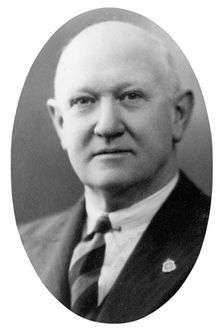 | MLA for Murray-Wellington 1930–1962 (resigned) | Liberal Party | 1 April 1947 | 23 February 1953 | McLarty–Watts Ministry | 1950 1953 | [18] |
| Governed in coalition with the Country Party. Introduced post-war industrial development, including oil refineries at Kwinana. Established the State Housing Commission. Lost office at the 1953 election. | |||||||||
| 18 | Albert Hawke (1900–1986) | 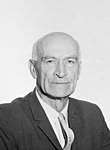 | MLA for Northam 1933–1968 (did not contest) | Labor Party | 23 February 1953 | 2 April 1959 | Hawke Ministry | 1956 1959 | [19] |
| Improved public housing. Aboriginal Australians given citizenship rights in 1954. Passed heavily criticised anti-profiteering legislation. The first premier born in the 20th century. | |||||||||
| 19 | Sir David Brand (1912–1979) | 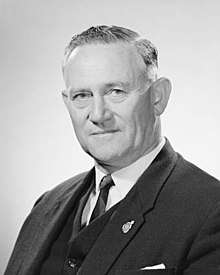 | MLA for Greenough 1945–1975 (resigned) | Liberal Party | 2 April 1959 | 3 March 1971 | Brand–Watts Ministry Brand–Nalder Ministry | 1962 1965 1968 1971 | [20] |
| First mining of iron ore in the Pilbara. Expanded mineral processing at Kwinana and in the South West. 1962 British Empire and Commonwealth Games held in Perth.Federal funding obtained for Ord River Scheme. Controversy over proposed demolition of the Barracks Arch. Mining Poseidon bubble burst. Conflict with the federal government over wheat quotas. Lost power at the 1971 election. | |||||||||
| 20 | John Tonkin (1902–1995) | 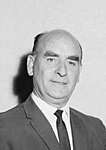 |
MLA for North-East Fremantle 1933–1950 (seat abolished) MLA for Melville 1950–1977 (did not contest) | Labor Party | 3 March 1971 | 8 April 1974 | Tonkin Ministry | 1974 | |
| Emphasis on education and further industrial development. | |||||||||
| 21 | Sir Charles Court (1911–2007) | 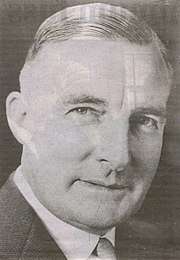 | MLA for Nedlands 1953–1982 (resigned) | Liberal Party | 8 April 1974 | 25 January 1982 | Court–McPharlin Ministry Court Ministry | 1977 1980 | |
| Emphasised development of mining, oil and natural gas industries, precipitating a mining boom. Perth–Fremantle railway line closed September 1979. Murdoch University and Art Gallery of Western Australia opened. 150th anniversary of European settlement celebrated. Retired January 1982. | |||||||||
| 22 | Ray O'Connor (1926–2013) | 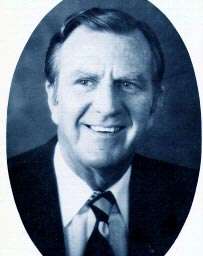 | MLA for North Perth 1959–1962 (seat abolished) MLA for Mount Lawley 1962–1984 (resigned) | Liberal Party | 25 January 1982 | 25 February 1983 | O'Connor Ministry | 1983 | |
| Continued Charles Court's policies of mining and industrial development. Perth Mint Swindle. Lost power at the 1983 election. In 1992, jailed for six months as part of the WA Inc scandal. | |||||||||
| 23 | Brian Burke (born 1947) | 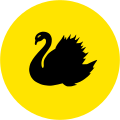 | MLA for Balcatta 1973–1974 (seat abolished) 1977–1983 (did not contest) MLA for Balga 1974–1977 (seat abolished) 1983–1988 (did not contest) | Labor Party | 25 February 1983 | 25 February 1988 | Burke Ministry | 1986 | |
| Fremantle railway line re-opened. Capital punishment abolished 1984. Stock market crash. In 1992, jailed for seven months as part of the WA Inc scandal. | |||||||||
| 24 | Peter Dowding (born 1943) | 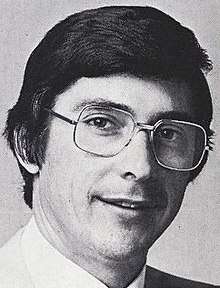 | MLC for North Province 1979–1986 (resigned) MLA for Maylands 1986–1990 (resigned) | Labor Party | 25 February 1988 | 12 February 1990 | Dowding Ministry | 1989 | |
| Took over from Brian Burke as premier in 1988. Resigned in 1990 after being challenged for the ALP leadership after a slump in the polls. | |||||||||
| 25 | Dr Carmen Lawrence (born 1948) | .png) | MLA for Subiaco 1986–1989 (seat abolished) MLA for Glendalough 1989–1994 (resigned) | Labor Party | 12 February 1990 | 16 February 1993 | Lawrence Ministry | 1993 | |
| Called a Royal Commission into WA Inc. Northern Suburbs Transit System begun. Perth City Busport opened. Later charged with perjury over the Easton affair, but acquitted in 1999. First female premier of any Australian state. Defeated at the 1993 election. | |||||||||
| 26 | Richard Court (born 1947) | 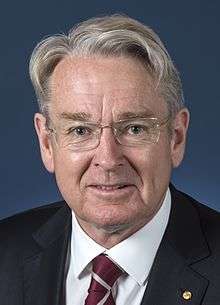 | MLA for Nedlands 1982–2001 (resigned) | Liberal Party | 16 February 1993 | 10 February 2001 | Court–Cowan Ministry | 1996 2001 | |
| Governed in coalition with the Nationals, led by Hendy Cowan. Scandals over the logging of old-growth forests and a finance-broking scheme. Graham Farmer Freeway and final stage of the Kwinana Freeway completed. Defeated at the 2001 election. | |||||||||
| 27 | Dr Geoff Gallop (born 1951) | .jpg) | MLA for Victoria Park 1986–2006 (resigned) | Labor Party | 10 February 2001 | 25 January 2006 | Gallop Ministry | 2005 | |
| Swan Valley Nyungah Community closed after allegations of rape, substance abuse and child abuse, later the subject of the Gordon Inquiry. Resigned in 2006 to deal with depression. | |||||||||
| 28 | Alan Carpenter (born 1957) | .jpg) | MLA for Willagee 1996–2009 (resigned) | Labor Party | 25 January 2006 | 23 September 2008 | Carpenter Ministry | 2008 | |
| Mandurah railway line opened. Removed three ministers after allegations of impropriety involving former premier Brian Burke by the Corruption and Crime Commission. Defeated at the 2008 election. | |||||||||
| 29 | Colin Barnett (born 1950) | _crop.jpg) | MLA for Cottesloe 1990–2018 (resigned) | Liberal Party | 23 September 2008 | 17 March 2017 | Barnett Ministry | 2013 2017 | |
| Minority government in first term in partnership with the National Party. Developed Perth's foreshore, began and completed construction of Elizabeth Quay, introduced plans for a new Perth Stadium, completed Gateway WA Road project, began Perth Freight Link and NorthLink WA Road projects, partially deregulated Perth's shopping hours, and sunk the railway line that divides Perth and Northbridge. Lost the state's AAA credit rating and presided over a 6.5% unemployment rate.[21][22][23] Defeated at the 2017 election. | |||||||||
| 30 | Mark McGowan (born 1967) | 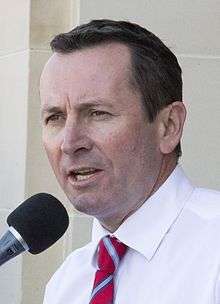 | MLA for Rockingham 1996–present | Labor Party | 17 March 2017 | Incumbent | McGowan Ministry | 2017 | |
| Won the 2017 state election. Premier during the 2020 COVID-19 pandemic. | |||||||||
Living former premiers
As of 13 August 2020, seven former premiers are alive, the oldest being Peter Dowding (born 1943), who served from 1988 to 1990. The most recent premier to die was Ray O'Connor, on 25 February 2013, aged 86.
| Name | Term as premier | Date of birth | Current age |
|---|---|---|---|
| Brian Burke | 1983–1988 | 25 February 1947 | 73 years, 170 days |
| Peter Dowding | 1988–1990 | 6 October 1943 | 76 years, 312 days |
| Dr Carmen Lawrence | 1990–1993 | 2 March 1948 | 72 years, 164 days |
| Richard Court | 1993–2001 | 27 September 1947 | 72 years, 321 days |
| Dr Geoff Gallop | 2001–2006 | 27 September 1951 | 68 years, 321 days |
| Alan Carpenter | 2006–2008 | 4 January 1957 | 63 years, 222 days |
| Colin Barnett | 2008–2017 | 15 July 1950 | 70 years, 29 days |
Graphical timeline
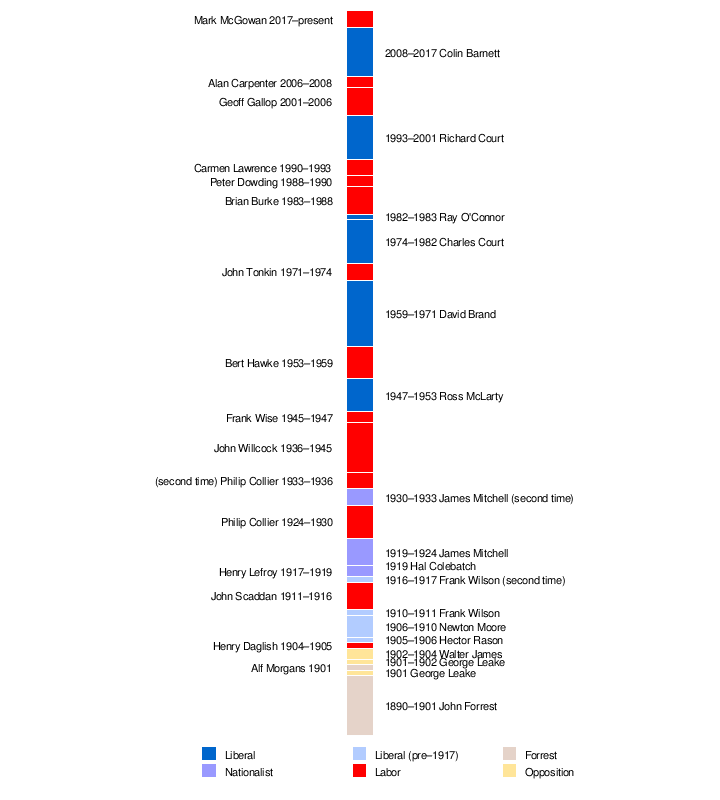
See also
| Wikimedia Commons has media related to Premiers of Western Australia. |
Notes
a The only premier to serve in the upper house while premier was Sir Hal Colebatch, who was elected by the Nationalist Party to fill the vacancy presented by the resignation of Henry Lefroy, on the condition that a seat in the lower house would be found for him. He served as premier for a month before resigning after no seat could be found.
b Prior to the 1904 election, no organised political parties existed, other than the Labor Party. Parliamentary factions included the Ministerialist, or pro-Forrest, faction, and the Opposition, or pro-Leake, faction.
c Leake died in office on 24 June 1902 from complications resulting from pneumonia, but the new Walter James-led ministry was not sworn in until 1 July 1902. Walter Kingsmill served as Acting Premier during this time.
References
- "Mark McGowan sworn in as WA's 30th Premier". ABC News. 17 March 2017.
- Constitution ACT 1889 (WA).
- Crowley, F. K. "Forrest, Sir John (1847–1918)". Australian Dictionary of Biography. Australian National University. Retrieved 30 January 2012.
- Garden, Donald S. "Throssell, George (1840–1910)". Australian Dictionary of Biography. Australian National University. Retrieved 30 January 2012.
- De Garis, B. K. "Leake, George (1856–1902)". Australian Dictionary of Biography. Australian National University. Retrieved 30 January 2012.
- Bolton, G. C. "Morgans, Alfred Edward (1850–1933)". Australian Dictionary of Biography. Australian National University. Retrieved 30 January 2012.
- Hunt, Lyall. "James, Sir Walter Hartwell (1863–1943)". Australian Dictionary of Biography. Australian National University. Retrieved 30 January 2012.
- Gibbney, H. J. "Daglish, Henry (1866–1920)". Australian Dictionary of Biography. Australian National University. Retrieved 30 January 2012.
- Bolton, G. C. "Rason, Sir Cornthwaite Hector William James (1858–1927)". Australian Dictionary of Biography. Australian National University. Retrieved 30 January 2012.
- Adams, David. "Moore, Sir Newton James (1870–1936)". Australian Dictionary of Biography. Australian National University. Retrieved 30 January 2012.
- Black, David. "Wilson, Frank (1859–1918)". Australian Dictionary of Biography. Australian National University. Retrieved 30 January 2012.
- Robertson, J. R. "Scaddan, John (1876–1934)". Australian Dictionary of Biography. Australian National University. Retrieved 30 January 2012.
- Cameron, Catherine. "Lefroy, Sir Henry Bruce (1853–1930)". Australian Dictionary of Biography. Australian National University. Retrieved 30 January 2012.
- De Garis, B. K. "Colebatch, Sir Harry Pateshall (Hal) (1872–1953)". Australian Dictionary of Biography. Australian National University. Retrieved 30 January 2012.
- Bolton, G. C. "Mitchell, Sir James (1866–1951)". Australian Dictionary of Biography. Australian National University. Retrieved 30 January 2012.
- Black, David. "Collier, Philip (1873–1948)". Australian Dictionary of Biography. Australian National University. Retrieved 30 January 2012.
- Doohan, Noelene. "Willcock, John Collings (1879–1956)". Australian Dictionary of Biography. Australian National University. Retrieved 30 January 2012.
- Layman, Lenore. "McLarty, Sir Duncan Ross (1891–1962)". Australian Dictionary of Biography. Australian National University. Retrieved 30 January 2012.
- Pendal, Phillip. "Hawke, Albert Redvers George (Bert) (1900–1986)". Australian Dictionary of Biography. Australian National University. Retrieved 30 January 2012.
- Black, David. "Brand, Sir David (1912–1979)". Australian Dictionary of Biography. Australian National University. Retrieved 30 January 2012.
- "WA loses its AAA credit rating as revenue declines and debt blows out". Australian Broadcasting Corporation. 20 September 2013.
- "Moody's downgrades WA credit rating as commodities prices plunge; fears of debt blowout". Australian Broadcasting Corporation. 8 February 2016.
- "WA Liberals wield double-edged sword as they target Labor's election promise costings". Australian Broadcasting Corporation. 4 March 2017.
Further reading
- Reid, G. S. and M. R. Oliver (1982). The Premiers of Western Australia 1890–1982. University of Western Australia Press. Nedlands, Western Australia. ISBN 0-85564-214-9.
- The Constitution Centre of Western Australia (2002). Governors and Premiers of Western Australia. West Perth, Western Australia. ISBN 0-7307-3821-3.